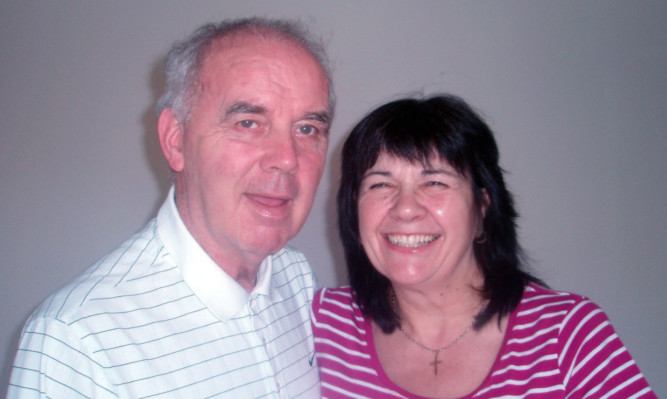The widow of Dundee United legend Frank Kopel has welcomed the announcement of a new drug to battle alzheimer’s.
Frank died after a six-year battle with the devastating illness.
Now Amanda Kopel says she wants to know how many more people still have to die before there is a guaranteed cure.
Solanezumab is the first drug to attack the causes of alzheimer’s, cutting the rate of the condition’s progression by about a third.
Other drugs currently available only alleviate the symptoms.
Amanda said it was “good news” that a drug had been discovered which could slow the advance of the disease, which affects 500,000 people in Britain,
But she said people should not get too excited at this stage.
“It’s good to hear that they think they have found something that can help,” said Amanda, who is leading the Frank’s Law campaign to secure fairer personal care for dementia sufferers, regardless of their age.
“But this drug is in its infancy. How many more people will die before doctors can say they have found a cure?”
Amanda said while Solanezumab does seem promising at this stage, it still doesn’t give people diagnosed with alzheimer’s a cure for the illness.
She said: “I believe there still has to be a massive surge of funding into research.
“There also has to be much more public awareness raised of the causes and consequences of this disease, which can attack anyone at any age.
“Other illnesses, such as cancer, have a much higher profile and I would like to see much more money spent researching alzheimer’s.”
Frank died aged only 59 after a long battle with the illness, having been diagnosed at a relatively young age. Because he was aged under 65, the Kopels had to pay around £400 a month for council care services.
Amanda is now fighting for Frank’s Law to get a fairer care system for families looking after a younger, terminally ill person at home.
“After Frank died, people asked me why I was carrying on the campaign because we would no longer benefit from any changes in the law,” continued Amanda.
“But I now know many other people under 65 who are struggling to afford to care for loved ones with terminal illnesses.
“It’s good to know a drug may have been discovered that could help.
“But it will be a long time before doctors can tell patients the bad news is they have alzheimer’s, but the good news is they can be cured.”
